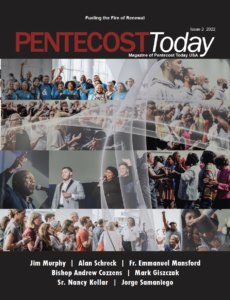14th Sunday in Ordinary Time
Meditation and Questions for Reflection or Group Discussion
Mass Readings:
1st Reading Ezekiel 2:2-5
Responsorial: Psalm 123:1-4
2nd Reading: 2 Corinthians 12:7-10
Gospel: Mark 6:1-6
A thorn in the flesh . . . (2 Corinthians 12:7)
Many theologians have guessed as to what Paul was referring to. Some say it was something physical like a chronic eye problem, migraines, or a speech impediment. Some say Paul was talking about temptations from the devil. Still others say Paul was referring to those “false apostles” who do a “great deal of harm” (2 Corinthians 11:13; 2 Timothy 4:14). Whatever it was, this “thorn” caused Paul a great deal of distress.
Now, compared to last Sunday’s Gospel, which told us that Jesus heals people who have faith in him, today’s reading tells us that even people who have great faith are not always healed. Paul had great faith, and he begged the Lord to deliver him, but the thorn remained.
Let this sink in for a moment: Paul the miracle worker, a man through whom people were healed just by touching his clothes, was himself not healed (Acts 19:12). Clearly, healing is a mystery that we cannot fully understand.
But here is what we can understand: God, our heavenly Father, knows us intimately (Jeremiah 1:5). He knows why Paul was not healed of this thorn. He knows why Francis of Assisi was not healed of his eye disease. He knows why some of our loved ones continue to suffer as well.
God knows all of the thorns in our lives—spiritual, emotional, and physical—and he knows the plans he has for our lives. In many cases, we won’t find the answers to these mysteries until we are united with the Lord in heaven. But that doesn’t mean we should lose our faith. If anything, these mysteries should deepen it!
Sometimes, the only answer is to pray for courage, resiliency, and steadfastness. Sometimes, the only answer we have is to trust God and have faith in “what we do not see” (Hebrews 11:1).
This is exactly what Paul did. He trusted that God’s grace would be sufficient for him. And it was sufficient—just as it can be for all of us.
“Lord, help me to deal with the thorns in my life. Jesus, I surrender them to you.”
Download this reflection with discussion questions here.
(Many thanks to The Word Among Us (www.wau.org) for allowing us to use meditations from their monthly devotional magazine. Used with permission.)
Sunday, July 8, 2018
Questions for Reflection or Group Discussion:
- In the first reading, Ezekiel tells of his commissioning to be a prophet to the nation of Israel: As the LORD spoke to me, the spirit entered into me and set me on my feet, and I heard the one who was speaking say to me: Son of man, I am sending you to the Israelites, rebels who have rebelled against me. … And whether they heed or resist—for they are a rebellious house—they shall know that a prophet has been among them.
- Why do you think receiving the Spirit was so important to Ezekiel in fulfilling his prophetic mission?
- In what way is receiving the Holy Spirit important to your fulfilling God’s call for your life?
- How often do you turn to the Holy Spirit to ask for his guidance? How often should you?
- The Responsorial Psalm begins with these words: To you I lift up my eyes who are enthroned in heaven —As the eyes of servants are on the hands of their masters. As the eyes of a maid are on the hands of her mistress, So are our eyes on the LORD, our God, till he have pity on us.
- The psalmist reminds us how important it is to keep “our eyes on the LORD, our God, till he have pity on us. How easy is it for you to take your eyes off the Lord during the busyness of your day and the many distractions you encounter?
- What steps can you take to turn to the Lord (and the Holy Spirit) more often during the day?
- The second reading opens with these words: Brothers and sisters: That I, Paul, might not become too elated, because of the abundance of the revelations, a thorn in the flesh was given to me, an angel of Satan, to beat me, to keep me from being too elated. Three times I begged the Lord about this, that it might leave me, but he said to me, “My grace is sufficient for you, for power is made perfect in weakness.” It ends with these words of Paul: Therefore, I am content with weaknesses, insults, hardships, persecutions, and constraints, for the sake of Christ; for when I am weak, then I am strong.
- What do you think the Lord meant when he said these words to St. Paul: My grace is sufficient for you, for power is made perfect in weakness?
- What do you think Paul meant when he said, for when I am weak, then I am strong? How do these words apply to your life?
- How would you describe the times in your life when you experienced the sufficiency, power, and strength of the Lord in a time of difficulty and weakness?
- In the Gospel reading, we read of this reaction by many people to Jesus in his hometown: They said, “Where did this man get all this? What kind of wisdom has been given him? What mighty deeds are wrought by his hands! Is he not the carpenter, the son of Mary, and the brother of James and Joses and Judas and Simon? And are not his sisters here with us?” And they took offense at him. It ends with these words: So he was not able to perform any mighty deed there, apart from curing a few sick people by laying his hands on them. He was amazed at their lack of faith.
- Why do you think many of the people in Jesus’ hometown took offense at him?
- Why do you think they failed to recognize Jesus for who he is: the Messiah, Son of God, and Lord?
- Why do you think Jesus was amazed at their lack of faith? What do you think Jesus’ reaction would be to your faith in him? Why?
- The meditation is a reflection on the second reading and it describes St. Paul’s struggles with these words: “Now, compared to last Sunday’s Gospel, which told us that Jesus heals people who have faith in him, today’s reading tells us that even people who have great faith are not always healed. Paul had great faith, and he begged the Lord to deliver him, but the thorn remained. Let this sink in for a moment: Paul the miracle worker, a man through whom people were healed just by touching his clothes, was himself not healed (Acts 19:12). Clearly, healing is a mystery that we cannot fully understand.” It ends with these words: “Sometimes, the only answer we have is to trust God and have faith in ‘what we do not see’ (Hebrews 11:1). This is exactly what Paul did. He trusted that God’s grace would be sufficient for him. And it was sufficient—just as it can be for all of us.”
- What do you think these words mean: “Clearly, healing is a mystery that we cannot fully understand?”
- The meditation also says that St. Paul “trusted that God’s grace would be sufficient for him. And it was sufficient—just as it can be for all of us.” In what ways do these words apply to you?
- Take some time now to pray and ask the Lord for the grace to deal with the “thorns” in your life, recognizing that his “grace is sufficient for you.” Use the prayer below from the end of the meditation as the starting point.
“Lord, help me to deal with the thorns in my life. Jesus, I surrender them to you.”
[The discussion questions were created by Maurice Blumberg, who is currently a member of the board of directors of the ChristLife Catholic Ministry for Evangelization (www.christlife.org) and a member of the National Service Committee Council of the Catholic Charismatic Renewal (www.nsc-chariscenter.org). Maurice was also the founding executive director of the National fellowship of Catholic Men, a chairman of the board of The Word Among Us (www.wau.org), and director of partner relations for The Word Among Us Partners ministry. He can be contacted at (Enable Javascript to see the email address) mblumberg@wau.org or mblumberg@aol.com.


 Click Here for us to pray for your intentions through our new website.
Click Here for us to pray for your intentions through our new website. 
